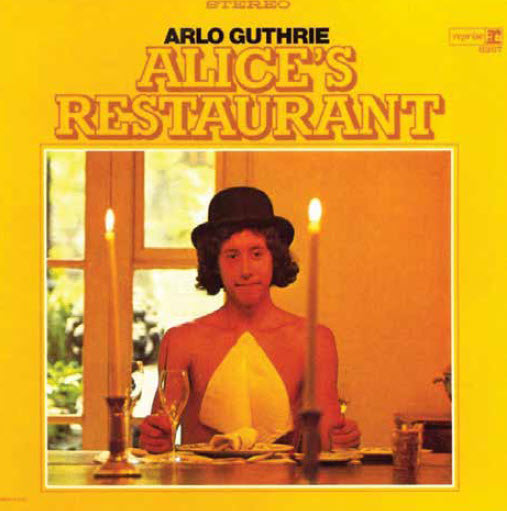I wanted to take the chance to clear up any confusion from my last article. I referenced a song that told an amusing story involving littering. Arlo Guthrie wrote “Alice’s Restaurant” as a protest against the Vietnam War in 1967. So, what exactly does a song protesting the Vietnam War and the draft have to do with littering? This song is a quite satirical and exaggerated account of a true story of Arlo Guthrie’s experience. It’s also a rather long song — over eighteen minutes of folk rock, talking blues.
This song begins with a Thanksgiving gathering of friends at their friend Alice’s who lives in the church. She has a large trash pile. So the friends, in their VW Microbus, decide to take Alice’s trash with their own to the dump, which is closed on Thanksgiving. They see another pile of garbage at the bottom of a cliff off a side road and decide to add their garbage to that pile. Being a slow day in a small town, this was portrayed as a major criminal act, they even took “twenty-seven eight-by-ten color glossy photographs with circles and arrows and a paragraph on the back of each one explaining what each one was, to be used as evidence against us. Took pictures of the approach, the getaway, the northwest corner the southwest corner, and that’s not to mention the aerial photography!”
Arlo Guthrie and his friend were immediately arrested by Officer Obie because this was the biggest story in the town in many years. They were detained, but Alice bailed them out, and they went back to her house for another Thanksgiving feast. When they appeared in court the next day, the judge walked in with his “seein’ eye dog” — he never looked at the “twenty-seven eight-by-ten color glossy photographs with circles and arrows and a paragraph on the back of each one explaining what each one was, to be used as evidence against them.” They were fined and ordered by the town judge to pick up the trash. I’m sure you’re wondering what in the world this has to do with the draft by now.
When Arlo Guthrie received his draft letter, he was sent to the Army building on Whitehall Street in New York City for his pre-war physical examination. He arrived hungover, and pretended to be homicidal so he would be found unfit for service — his methods proved unsuccessful. After a while, he was asked if he had ever been convicted of a crime. He explained the VW Microbus and the “twenty-seven eight-by-ten color glossy photographs with circles and arrows and a paragraph on the back of each one explaining what each one was.” He was sent to the “Group W Bench” with other criminals. When explaining his littering charge to the hardened criminals, he had to add “and being a nuisance” to be accepted on the Group “W” Bench.
When Guthrie saw one of the questions on the paperwork asked whether he had rehabilitated himself enough to join the Army since the crime, he highlighted the irony of having to prove himself reformed from a crime of littering while sitting on the Group “W” Bench. Which is where we are — Is a charge for dumping or littering worth tarnishing your record? Do what is right and put small litter in the trash can and take large loads to the dump. It is not expensive at all…
And just a tidbit of neat information, the church where Alice Brock lived was sold after a movie was made and it earned unwanted publicity. It changed hands several times but was purchased by Arlo Guthrie in 1991. He converted it to the Guthrie Center, a nondenominational, interfaith meeting place. In later years, the Guthrie Center became a folk music venue, hosting a Thursday evening hootenanny as well as the Troubadour Concert series annually from Memorial Day to Labor Day. The Troubadour series helps to support the church’s free community lunch program which is held at the church every Wednesday at noon. On Thanksgiving, the church hosts a “Thanksgiving dinner that can’t be beat” for the local community. The annual “Garbage Trail Walk,” retracing the steps of Arlo and folksinger Rick Robbins, raises money for Huntington’s disease research. The disease was the cause of death for Arlo’s father, famed folk musician Woody Guthrie, and two of Arlo’s sisters.
By: Claire Tribble – Executive Director, Keep Athens-Limestone Beautiful








